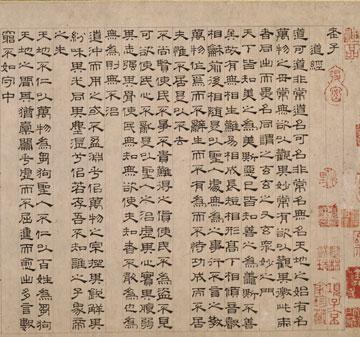I'm not usually one to use existing works as the basis for my work, but I make an exception with very old and/or public domain works. Not only because I won't get into any legal trouble, but because I cannot possibly harm the artist, who must have been dead over 75 years.
Lao Tzu certainly qualifies, since his works are believed to have been written about 2500 years ago, though the exact date an authorship remain questionable. The Lao Tzu writings are useful in another respect too. They have been very important to me since I first read them when I was 14, so they fit the whole "retro" nature of the project, from my perspective, as they represent a part of my past.
I liked the Dao De Ching so much, I looked for potential companion works to read. Having discovered a (potentially apocryphal) story about Lao Tzu conversing with and teaching Confucius, I mistakenly thought the Analytics would be a great companion to the Dao De Ching. I could not have been more wrong, especially when Confucius writes so much about obedience to parents. This is not what a rebellious young teen wants to read.
That said, unfaltering obedience to parents doesn't pass the western philosophy smell test. What if your parent is a sociopath? Are you still supposed to be completely obedient. In Confucius world, you could have escaped a Nuremberg tribunal if the illegal and lethal order came from your dad. "I had to torture that queer, my father told me to do it." And you can't disobey your father. I exaggerate and I digress.
However, I suspected, given the ancient nature of the work, that it had been translated into English before. It might not have Lau's poetic touch, but it would still get the job done. I started at project Gutenberg, a great resource for public domain texts. But I found something even better. This site, were you can read 23 English translations at the same time. I'm totally blown away by it. I've never felt closer to the actual Chinese, which is a really good thing, if my plan is to turn ancient philosophical text into song lyrics. As it is. actually.
I love the Rashamon effect. In the movie, it leads to chaos, no one knows what has happened, because there are too many conflicting accounts. But what happens in Rashamon is an outlier. Normally, mutliple accounts get you closer, not farther from the truth. This is the genius of the wiki, though wikipedia manages to get it wrong, IMO.
Guessing how many jelly beans are in a jar, the crowd will be more accurate than any one individual. Unfortunately, the architecture of Wikipedia gives individuals the ability to edit the opinion of the masses. To say nothing of the fact, that the masses often misremember history.
But in the controlled world of translation of ancient texts, the different views get you closer, not farther from the truth. Which is perfect for me. If I'm to turn the writings of Lao Tzu into song lyrics. I need to know the "truth" of the starting point, before I start inventing and editing.
.jpg)



No comments:
Post a Comment